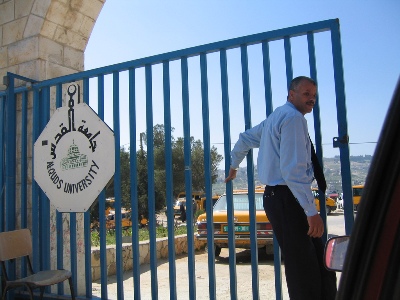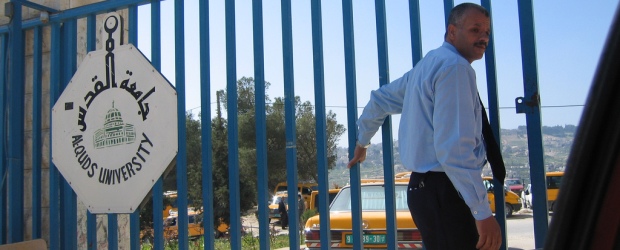
For American high school seniors, October means one thing: College applications are right around the corner.
It’s almost so obvious it doesn’t need saying, but in the Gaza Strip, there is no season when the minds of a generation automatically turn toward college applications.
Here in America, tis the season for prospective students to roll their eyes as their anxious parents ask campus tour guides inane questions. They wonder what kind of school is right for them: Public or private? Large or small? Rural or urban? In this economy – not to mention this election – they’re also beginning to fret about scholarships and loans.
There, in the Gaza Strip, the questions on the minds of those old enough to become our peers – old enough to become college students – are far more basic. Yet even in the world’s most desolate communities, a few will always aspire to escape to a life that offers much more.
But the options of those few in Gaza who are contemplating college were limited earlier this week when the United States government decided to pull the plug on a two-year-old program that would have given scholarships to 30 students in Gaza this year so that they could attend established Palestinian universities in the West Bank. The program, launched by Secretary of State Hillary Clinton, has created opportunities for young students who have great potential but lack financial resources.
To be fair, Israel gave the U.S. little choice. Since the program began two years ago, the Israeli government has allowed students to take advantage of this program. But this year’s crop of students was denied the necessary permits to travel from Gaza to the West Bank. As a result, the U.S. cancelled the program.
This news saddens us deeply – but it is not the first time in recent memory that students from Gaza had a chance at higher education yanked away from them. A year ago, a similar program that offered students from Gaza the chance to study in America was discontinued by Hamas.
Throughout this election we have seen the value of a college education debated a great deal, an issue that college-age voters obviously care deeply about. And perhaps there is an argument worth making that the rewards of college are not worth the rising cost of tuition for some Americans. In Gaza, though, it is hard to deny that there are fewer alternative avenues to success than there are in the United States, and providing the chance for young Palestinians to learn and grow is obviously a noble cause.
Throughout this election, we have also seen grandiose attempts to pander to Jewish voters on the subject of Israel, an issue that college-age voters – even most Jewish ones – will give little consideration to when they step into the voting booth next month. But perhaps the issues of higher education and the Israeli-Palestinian situation are not separate issues.
It is practically a truism that more education equals greater prosperity and a lessening of radicalism and fundamentalism. With that in mind, Israel and the U.S. should make it easier, not harder, for Palestinians to go to college – whether that’s here, in the West Bank or elsewhere.
Imagine for a second that you are one of these 30 students. Does this situation make you feel any sort of affection toward Israel or the U.S.? Would this make you more likely to work toward peace? We assume not. Taking away these scholarships only gives promising, high-caliber students another legitimate reason to feel frustration or anger toward Israel and the United States.
The reason Israel provided for refusing to grant the necessary travel permits was, predictably, “security concerns.” They offer about 5,000 of these permits per month for “humanitarian cases” but they do not define education as a humanitarian concern. This is myopic and narrow-minded. As college students who believe that universities have the potential to ignite in students a real desire to affect positive change in the world and the power to provide them with the tools to do so, we disagree with that definition. Providing an education is the greatest humanitarian act; consider the old saying about teaching someone to fish.
The Associated Press cites the example of Amal Ashour, an 18-year-old hoping to major in English literature. She spent a year of high school studying in Minnesota – and apparently she got through that without committing any acts of terrorism!
Forgive our glibness, but we cannot fathom why Israel considers Ashour a security threat. But unfortunately, they do. And for that she is denied access to the education that she wants and needs. Instead of the experience she would have had with a scholarship, she is studying in Gaza at a school run by Hamas. Why Israel sees that as more as beneficial to its long-term security is beyond us.
Playing politics with the lives of students is not only morally wrong, but strategically short-sighted. Perhaps some Israelis can go to bed tonight feeling a little safer because 30 young students from Gaza won’t be earning a diploma in the West Bank. But it’s not going to help us sleep any easier.
And as for America’s part in all this: The United States should offer these 30 students the chance to study here. It’s the least we can do.

